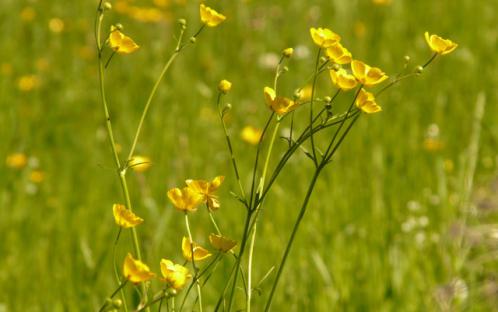By Samantha Kroll
Howard County
Extension Agent-Agriculture
Is it too early to start thinking about warm season weeds in your pasture?
The answer is NO.
Late February/early March is the time to think about weed control in bermudagrass.
“Bermudagrass’s dormant period is the time to take care of weed control in those warm season pastures,” said Dirk Philipp, Assistant Professor for the University of Arkansas System Division of Agriculture. Weeds are more than just an eye sore. They are competing for the same resources such as water, sunlight, and nutrients. Weeds can reduce the overall forage quality, palatability, and some may be toxic, resulting in nutrients lost which reduces an animal’s daily gain and the farm economics suffer all due to weeds.
Two of the most common weeds you see in South Arkansas pastures is buttercup and henbit. We all drive past those pastures that look like a sea of yellow and purple flowers, which is really a weed.
While both these weeds can be treated earlier as spring begins to approach, they both grow at a faster rate and the herbicides will be more effective. Philipp said that for henbit, products containing metsulfuron are recommended; while for buttercup, glyphosate or paraquat is recommended. Remember to read all labels carefully because restrictions may apply.
At the UA animal science research farm in Fayetteville, Philipp said researchers had very good experiences with glyphosate applied late February/early March. Because bermudagrass cannot be grazed or hayed for 60 days after dormant application, “The earlier the application, the better,” he said. “If you go out and think you need to spray, then it’s probably too late.“
Herbicides still work at relatively low temperatures, as long it is not freezing, and an early application in early February can be followed up with a second one in early March.
However, you need to remember that spraying a herbicide is not a fix-all weed control. In order to stay on top of your weed control you should do a weed inventory on a regular basis, along with a soil sample every few years. If you have a bad soil fertility, it will increase the growth of weeds. Philipp said, “Inadequate fertilizer application may weaken the forage stand.”
He also said that growers should let the stand develop a dense canopy but remove forage on a regular basis to open up the canopy for light penetration to the lower leaves, and to use grazing methods in accordance with your needs to increase efficiency of forage utilization.
For more information about controlling warm season weeds, call the Howard County Extension Office at (870)845-7517.








